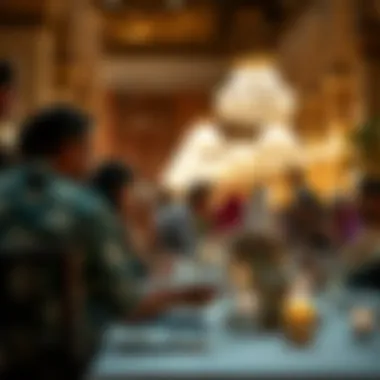Exploring Iftar Timings During Ramadan in the UAE


Intro
Ramadan, a month of spiritual reflection and community bonding, holds a special place in the hearts of many in the UAE. This period, characterized by fasting from dawn until sunset, culminates in the evening meal known as iftar. Understanding the timings of iftar is not just about watching the clock; it's intertwined with cultural customs and religious practices that vary throughout the region. Whether one is a resident or an investor in Dubai, knowledge of iftar timings enhances appreciation for this sacred month, providing insight into daily life during Ramadan.
The nuances of iftar timings in the UAE reflect the diversity of its population. Communities come together to break their fasts, imbibing a sense of unity. Yet, regional variations also impact how and when iftar is observed. Timing can shift based on geographical location, which introduces complexity. In this section, we explore these intricacies, emphasizing their significance for anyone looking to engage meaningfully with the local customs while navigating the realm of real estate investment or simply being a part of the community.
So, whether you're a local resident familiar with the rhythms of Ramadan or an outsider curious about the traditions, let’s break down what to expect and how to approach the iftar experience this Ramadan.
Intro to Ramadan
Ramadan is not just a month on the Islamic calendar; it’s a deeply woven tapestry of history, culture, and spirituality that resonates significantly throughout the UAE. During this period, Muslims across the globe engage in fasting from dawn until sunset, creating a unique rhythm of life that underscores the importance of self-discipline, empathy, and community. This article seeks to elucidate the various aspects of Ramadan, but particularly focuses on the timings of Iftar—the moment when the fast is broken at sunset.
Understanding Iftar timings serves a dual purpose: it highlights the adherence to religious practices while also considering the practical implications for those living in the UAE, including investors and homebuyers. Knowing when to break the fast not only impacts personal life but also influences business practices, communal gatherings, and even dining options available in restaurants. Thus, the knowledge of Iftar timings is vital for anyone navigating life in the UAE during Ramadan.
Historical Significance
The roots of Ramadan run deep in Islamic tradition, marking the month in which the Quran was revealed to the Prophet Muhammad. It is a time for reflection, remembrance, and spiritual growth. Over centuries, the observance of Ramadan has been refined and local customs have emerged, creating a rich historical tapestry that varies by region. In the context of the UAE, this month is embraced with vigor, showcasing devotion and cultural pride.
Historically, the act of fasting is not just an individual endeavor; it connects people to a larger narrative of community and belonging, showcasing how this sacred time fosters unity and fosters a deep sense of connection among practitioners. This historical understanding brings depth to contemporary practices and informs how Iftar is perceived and celebrated.
Cultural Practices During Ramadan
Cultural practices during Ramadan in the UAE are an exhibition of communal spirit and tradition. Iftar, as the culminating event of the day's fast, becomes a focal point for social interaction. Families and friends gather to break their fast together, sharing meals that often extend beyond the simple act of eating—these gatherings symbolize togetherness and charity.
In the UAE, it’s common to see large tents set up in public areas, where people from all walks of life come to partake in Iftar meals. This inclusiveness is a hallmark of Emirati culture, where food becomes more than sustenance but a medium for community engagement and hospitality.
"During Ramadan, the breaking of fast is more than satisfying hunger; it’s about sharing, caring, and fostering relationships within the community."
Additionally, traditional dishes such as dates, lentil soup, and various meat dishes play a significant role during Iftar. The UAE’s approach to these culinary traditions is influenced by a blend of local ingredients and international flavors, reflecting the country’s cosmopolitan essence. It's a vibrant celebration where customs and flavors intermingle, making each Ramadan unique and special within the cultural landscape.
The festival is not limited to just what one eats; it extends to how people interact. Acts of charity increase during this month, with many choosing to share their meals or donate to those less fortunate. This dual focus on personal spirituality and communal responsibility enriches the social fabric of the nation, making Ramadan a truly immersive experience both personally and culturally.
Understanding Iftar Timings
Understanding the timings for iftar during Ramadan is critical for Muslims, especially in a vibrant context like the UAE. It's more than just a matter of breaking a fast; it represents a time of spiritual reflection, community bonding, and cultural practices that have been passed down through generations. As cities like Dubai and Abu Dhabi come alive when the sun dips below the horizon, the exact timing for iftar can influence daily activities and social dynamics for residents and visitors alike.
Specifically, knowing how to calculate iftar timings aids in planning both personal meals and community gatherings. Residents who adjust their work schedules, families who decide whether to invite friends over or dine out, and investors intrigued by shifts in consumer behavior all rely on accurate iftar timings. As a simple yet significant aspect of daily life during Ramadan, it holds a special place in everyone's routines.
Additionally, grasping the broader implications of these timings lends to a richer appreciation of the month. The sense of urgency prior to iftar, the communal prayer, and the cherished moments shared around the table, all enhance the experience of Ramadan. So, getting these timings right is paramount, as they affect not just individual plans but broader marketing and sales strategies too.
What is Iftar?
Iftar is the meal that marks the end of fasting each day during Ramadan. As the sun sets, families and friends gather to break their fast, a moment steeped in profound significance. Traditionally, the fast is broken with dates and water, following the example of the Prophet Muhammad. This acts as a gentle transition from fasting to enjoying a more substantial meal, which often includes various cultural delicacies. In the UAE, dishes like harira (a rich soup) and qatayef (sweet dumplings) are commonly served during iftar, making it a culinary celebration as well.
Importantly, iftar is not merely a time for eating; it serves as a reminder of the values of empathy and charity. By experiencing hunger, individuals are encouraged to reflect on those less fortunate, fostering a community-centric spirit. The meal is often shared across tables in homes, public gatherings, or even charitable events, reinforcing bonds among families and communities.
Religious Importance of Iftar
From a religious standpoint, iftar represents a fundamental aspect of Ramadan observance. Breaking the fast is one of the Five Pillars of Islam—acts that are central to a Muslim’s faith. It embodies gratitude for the sustenance provided, alongside a reminder of the importance of discipline and self-restraint during the month.
Iftar is also a time for reflection and prayer. After breaking the fast, it is a customary practice to gather for the Maghrib prayer, which is performed right at sunset. This ritual symbolizes a moment of connection with the Almighty, allowing individuals to express gratitude and seek guidance. Moreover, many people believe that extended efforts towards charity during this period yield greater rewards, leading to an increase in donations and community support.
In a nutshell, iftar is a multifaceted observance, merging spiritual, cultural, and social elements into its essence. Understanding what iftar is and its religious importance sets the stage for appreciating the intricacies of the timing involved in the meal.


Calculating Iftar Timings
Understanding when to break fast during Ramadan is crucial for Muslims, particularly in a diverse setting like the UAE. The timing of iftar is dictated by the daily sunset, but several factors come into play that complicate this seemingly straightforward practice. This article section elucidates how iftar timings are calculated, emphasizing their significance in both a religious and sociocultural context.
Role of Islamic Authorities
In the UAE, Islamic authorities are the main players in determining iftar times. These organizations rely on astronomical calculations based on the position of the sun, which varies daily. The UAE’s General Authority of Islamic Affairs and Endowments, among others, publishes the official timetable outlining these timings for each emirate. Their guidance provides a framework that harmonizes the practices of the community, ensuring that everyone is on the same page. This unity fosters a sense of belonging among Muslims, where they can break their fast simultaneously, reinforcing communal bonds.
Variations Based on Location
Impact of Geographic Position
Geographical positioning can dramatically affect iftar timings, especially in a nation as expansive as the UAE. For instance, the time when the sun sets in Abu Dhabi may be slightly different compared to Dubai, which is situated a tad northward. This slight variation might range from just a few minutes but is significant enough for individuals who are observing the fast to ensure they do not accidentally break it too early or late.
The key characteristic of this geographic impact lies in the curvature of the Earth and how it influences sunlight exposure. This crucial detail makes it beneficial for individuals to rely on local timetables published in their respective areas. By respecting these nuances, individuals can maintain their religious observance with precision, which is incredibly important during the holy month.
Urban vs. Rural Considerations
Urban and rural areas further highlight the stark contrast in iftar timings. In bustling urban centers like Dubai, the availability of modern conveniences such as mobile apps and websites that provide immediate updates on prayer and iftar timings has made the process more streamlined. Residents can rely on these tools to receive notifications as sunset approaches.
Conversely, rural areas may not have the same access to technology or updated information. Many individuals in these regions depend on the local mosque's announcements or community gatherings to learn the iftar timings. This reliance on community reinforces old traditions, but it also highlights a unique challenge: timing discrepancies can occur if localities are out of sync with official guidelines.
Overall, grasping how iftar timings are calculated sheds light on the various layers of adherence to religious practices within the UAE. Investors and homebuyers, especially those seeking properties that enhance their community experience during Ramadan, should consider the availability of local resources, as these can greatly affect the overall experience of observing this significant period.
Specific Iftar Timings in the UAE
During Ramadan, the timing of Iftar becomes a cultural focal point in the UAE, symbolizing the end of a day of fasting and the collective breaking of bread. Understanding specific Iftar timings not only highlights the religious devotion of the month but also affects social gatherings and community interactions. In a country known for its diverse population, these timings can vary slightly based on local astronomical observations, enhancing the sense of unity and shared experience amongst Muslims and encouraging cultural exchange.
Dubai Iftar Timings
In Dubai, Iftar timings are typically announced by local mosques and Islamic organizations. As the sun sets, the call to prayer, or Adhan, signals the moment to break the fast. During March 2023, for instance, Dubai's Iftar might fall between 6:30 PM to 6:45 PM, depending on the exact day. This variance highlights how Islamic authorities track the solar calendar diligently, which is crucial for maintaining adherence to tradition.
Local restaurants and hotels often plan special Iftar buffets that open up right at the Iftar time, giving residents and tourists alike an opportunity to enjoy an extravagant dining experience post-fasting. With many options catering to different tastes—including traditional dishes like dates, lentil soup, and various meat dishes—this is a vibrant time for Dubai's culinary scene. The emphasis on community meals fosters camaraderie among friends and family.
Abu Dhabi Iftar Timings
Abu Dhabi, the capital city, shares a similar practice in determining Iftar timings, yet it also provides its own unique twist. Typically, the timing here can range from 6:35 PM to 6:50 PM in the same month of March 2023. The variation largely arises from Abu Dhabi's geographical positioning, which can affect sunset times. Most Muslims living in the city tune in to local broadcasts or community announcements to get precise timings.
Notably, the Emirate prides itself on innovative Iftar experiences, some even serving Iftar under the stars at locations such as the Sheikh Zayed Grand Mosque. The grandeur of the location, combined with the spirit of Ramadan, creates an unforgettable ambiance that embodies cultural values.
Sharjah and Northern Emirates
When it comes to the Sharjah and Northern Emirates, the Iftar timings might slightly differ due to geographical positioning, generally coming in around 6:40 PM to 6:55 PM during March 2023. These variations underscore the collective participation of the Emirates, yet they also offer unique cultural dishes reflective of the local tastes.
In Sharjah, for example, you might find harees and maamoul served during Iftar, while smaller towns in the Northern Emirates often highlight local seafood dishes as an homage to their coastal heritage. Additionally, communal spaces are common for gathering, as families and friends prioritize collective dining to strengthen community ties.
"The beauty of Iftar lies not only in breaking the fast but also in coming together as one, embracing the spirit of Ramadan."
In essence, knowing the specific Iftar timings across the UAE adds to the overall experience of Ramadan, enriching social interactions and promoting a deeper understanding among residents and visitors alike. This shared practice enhances the bonds within communities, making the holy month one of reflection, socialization, and deep-rooted cultural appreciation.
Local Practices Surrounding Iftar
The local customs and traditions surrounding iftar in the UAE are not merely social gatherings; they represent an essential component of the Ramadan experience. The richness of these practices offers insights into the cultural fabric of the region, where families and communities come together to break their fast. Exploring the significance of these practices provides a comprehensive understanding of their impact on social bonds and community spirit.
Traditional Foods and Drinks


During Ramadan, the iftar meal transforms not just in significance but also in variety. Each emirate boasts a delectable array of traditional foods and drinks served during this special time. Dates, often the first thing eaten to break the fast, carry religious significance and are believed to restore energy after a long day of fasting. Alongside dates, each household might prepare several dishes that evoke nostalgia and cultural heritage.
Some common items include:
- Harira: A rich and hearty soup that originates from Moroccan cuisine but has found its way to UAE tables.
- Samosas: These fried or baked pastries, typically stuffed with meat or vegetables, are perfect for a crispy snack to start off the meal.
- Knafeh: A dessert made with thin noodle-like pastry soaked in syrup, it’s a decadent way to finish the meal.
- Laban or Qamar al-Din: Traditional drinks such as yogurt drink (laban) or apricot juice (qamar al-din) are usually served, providing a refreshing way to hydrate after a day of fasting.
The communal aspect of sharing food during iftar cannot be understated. Neighbors often gift plates of food to each other, reinforcing community ties and hospitality. This practice not only nurtures relationships but also ensures that the joy of breaking fast is experienced collectively.
Gathering and Community Aspects
The essence of iftar transcends the mere act of eating; it embodies the spirit of togetherness and unity among Muslims. Each evening during Ramadan, families come together, and the homes are filled with laughter, conversations, and shared experiences. These gatherings also play a critical role in strengthening community bonds as they promote inclusiveness.
During this month, larger community iftars are organized at mosques and public spaces, where residents can participate regardless of their economic standing. Such gatherings often showcase a variety of culinary delights, uniting people from diverse backgrounds.
The atmosphere is one of warmth and belonging, reflecting a sense of camaraderie. Volunteer groups also emerge during Ramadan, serving food to those in need, reinforcing the principle of sharing and charity, which is central to Islamic teachings.
Collectively, the social activities and gatherings that occur during iftar serve as a reminder of the core values of compassion and community. For investors and developers eyeing the UAE market, understanding these local practices can provide key insights into the lifestyle of the community, influencing market trends and investment decisions.
"A meal shared is a bond formed, and during the holy month, those bonds are treasured more than gold."
This observation encapsulates the significance of iftar, casting it as not just a meal, but as a gathering that binds the community together—essentially enriching the cultural landscape of the UAE during Ramadan.
Impact of Ramadan on Dubai's Real Estate
The month of Ramadan in the UAE isn’t just a time for reflection and spiritual growth; it also brings about notable shifts in various sectors, particularly real estate. Investors and stakeholders need to take a closer look at the nuances of the market during this period. In fact, the impact of Ramadan is twofold—it's about understanding how the festive month influences demand and supply dynamics in the property market, but also about how it shapes investor behavior.
Market Trends During Ramadan
During Ramadan, Dubai experiences a unique transformation in its real estate market. This period often signals a dip in residential property viewings. People tend to focus more on family time and religious observance than on bustling property transactions. Yet, this doesn't paint the full picture.
"Ramadan brings a different vibe to the city, with many choosing to wait until it’s over to make significant investments."
When Ramadan kicks off, we often see an uptick in short-term rentals and holiday properties as tourists flock to the UAE. Tour operators and property owners can capitalize on this influx by advertising special iftar experiences or accommodations geared toward visitors who want to enjoy the festive month. Additionally, as Ramadan progresses, the market sentiment can shift, paving the way for increased demand post-festivities, particularly around Eid.
Some specific trends to consider during this month include:
- Increased Interest in Family-Friendly Properties: Many families prefer larger homes or villas with outdoor space during Ramadan, as they entertain guests more frequently.
- Reduced Negotiation: Many buyers get a bit hesitant to haggle during Ramadan, favoring smoother transactions, which can sometimes benefit sellers.
- Eid Impact: As Ramadan wraps up, property viewings and transactions see a surge post-Eid when people are inclined to invest in new homes or rental properties, driven by bonuses and gifts received during the holiday.
Investor Behavior in Ramadan
Investors approach the real estate market with varying strategies during Ramadan. This holy month often instills a sense of patience among many, influencing how decisions are made. There’s this notion that business should slow down, allowing for deeper considerations rather than immediate transactions. Many investors may choose to sit on their hands, especially in the days leading up to Eid.
Key aspects of investor behavior during Ramadan include:
- Reflections and Strategy: Investors often take this time to re-evaluate their portfolios and make long-term decisions. The reflective nature of Ramadan can lead to more strategic investments.
- Focus on Community-Oriented Developments: Properties that cater to community living, offering amenities for gatherings, often attract more interest.
- Ethical Investing: There’s a heightened focus on community-focused developments during Ramadan, as investors often seek projects that resonate with the spirit of giving and helping others.
In summary, while some may consider the Ramadan period as a lull in the market, a deeper dive reveals a complex interplay of traditions and modern-day investment strategies. Investors and agents alike can find opportunities waiting to be harnessed by understanding these unique patterns.
Travel Considerations During Ramadan
Traveling during Ramadan in the UAE can present a unique set of challenges and surprises for visitors, especially for those unfamiliar with local customs. Understanding the dynamics at play during this month can make all the difference in enjoying a fulfilling trip.
For many, the holy month is not just about fasting, but also community bonding and cultural experiences. As a traveler, knowing how Ramadan can affect daily life— from the timing of meals to the altered pace of business— is crucial.


Visiting Dubai During Ramadan
Dubai, a bustling hub of trade and tourism, transforms noticeably during Ramadan. The city’s rhythm slows down in the daytime, as local Muslims observe fasting from dawn until sunset. While restaurants and cafes remain closed in public spaces during fasting hours, many establishments resort to a more discreet approach by providing take-away services.
As a tourist, it’s essential to practice sensitivity. While you may be tempted to grab a bite in public, doing so can come off as disrespectful to those fasting. Instead, during daylight, consider indulging in a leisurely walking tour or visiting indoor attractions like the Dubai Mall or the Dubai Aquarium. These spaces offer reprieve from the sun while still experiencing the city's vibrant atmosphere.
After sunset, the city undergoes a metamorphosis. Iftar gatherings, where families and friends come together to break their fast, lead to festive vibes that fill the air. Hostels, hotels, and other venues in the hospitality sector often provide special iftar menus. It’s an excellent opportunity to share in the culture, sample traditional dishes and drinks, while enjoying the electric ambiance of the city.
Iftar Options for Tourists
For tourists seeking to partake in the spirit of Ramadan, there are numerous options to enjoy Iftar in Dubai. Many restaurants, especially those in hotels, organize lavish buffets catering to both local and international palates.
- High-End Buffets: Luxury hotels like the Burj Al Arab or the Ritz-Carlton lay out sumptuous spreads during iftar with a plethora of Middle Eastern delicacies.
- Cultural Iftar Experiences: Certain cultural centers and traditional restaurants might host special gatherings that allow visitors to join locals in Iftar, providing a unique setting to understand the significance of the meal.
- Community Events: Some mosques or community organizations arrange public iftars with free meals, allowing for beautiful interactions among diverse groups of people.
These experiences not only provide delicious meals but also strengthen a sense of community. It's worth booking in advance, as popular venues can fill up quickly.
Relevance of Iftar Timings in Daily Life
Iftar timings carry substantial significance in the daily lives of individuals observing Ramadan in the UAE. This period, marking the end of daily fasting, is not just a meal but is interwoven with social, cultural, and religious dimensions. Understanding these timings impacts various aspects of daily life, especially for those working, participating in community activities, or investing in this vibrant region.
Work Schedules and Iftar
The work environment in the UAE during Ramadan experiences a remarkable transformation. Many companies adjust working hours, with the recognition that employees are fasting. A typical workday often commences later in the morning and wraps up early afternoon, allowing time for individuals to prepare for iftar. This change doesn't only reflect a respect for the religious observance but aims to maintain productivity while considering the health and well-being of employees.
- Common Adjustments:
- Working Hours: Usually shortened to accommodate breaking fast at sunset.
- Flexible Schedules: Employees may have the option to shift their hours for personal needs regarding iftar.
Moreover, for people in leadership or management roles, it becomes imperative to ensure that staff do not feel pressured to stay late during this holy month. Many place a high value on being home with their families or gathering with friends at sunset to break their fast, creating a sense of community and warmth.
The coordination of work schedules and iftar timings highlights the broader societal respect for cultural and religious practices.
Social Activities During Ramadan
The societal fabric in the UAE during Ramadan thrives on various social activities that revolve around iftar. As twilight approaches each day, families, friends, and neighbors come together to celebrate their shared experiences. Iftar is often marked by communal meals, where the spirit of togetherness radiates across different demographics.
- Gathering Points:
- Community Centers: Many local mosques and community centers host large iftar dinners, promoting interaction among diverse groups.
- Restaurants and Cafes: Establishments offer special iftar menus with traditional foods and drinks, drawing in both locals and tourists.
These gatherings go beyond simply indulging in food; they provide a platform to reinforce community bonds and foster understanding among different cultures residing in the UAE. Engaging in social activities during this month enhances feelings of goodwill and unity.
The relevance of iftar timings extends far beyond the mere act of eating. It shapes our work routines, influences our social engagements, and brings to life the essence of community during Ramadan in the UAE.
End
In summarizing the intricate web of factors surrounding Iftar timings during Ramadan in the UAE, it’s crucial to recognize how they invoke both religious and cultural understanding. Iftar is not merely a meal; it embodies a significant moment of spiritual connection and community engagement. This observance serves as a bridge between fasting and communal gathering, illuminating the essence of togetherness that Ramadan fosters.
Reflecting on Religious and Cultural Significance
The religious significance of Iftar cannot be overstated. It marks the end of daily fasting, a time for Muslims to reflect on their faith and values. The evening call to prayer reverberates through the streets, heralding the moment when individuals can break their fast. Families, friends, and neighbors often come together to share in this moment, showcasing a custom that transcends the act of eating to encompass gratitude, compassion, and unity.
Culturally, the month of Ramadan is a practical lesson in humility and empathy toward those less fortunate. The significance is amplified by local customs, such as serving traditional foods like dates and soup, which carry their own stories and signify authenticity. For many in the UAE, gathering for Iftar isn’t just about the meal; it’s about nurturing relationships and creating shared experiences that bind communities closer together.
Final Thoughts on Iftar and Real Estate
As we explore the relationship between Iftar and the real estate sector in Dubai, it's essential to note how Ramadan influences market dynamics. Developers and investors must consider the cultural implications of Ramadan on property usage and investor behavior. During this sacred month, there’s often a shift in priorities, with community spaces gaining significance. This can affect property demand, as many families look to reside in areas that enhance their Ramadan experience, such as neighborhoods with abundant Iftar options or culturally resonant venues.
Moreover, businesses that align their strategies with the spirit of Ramadan can become more appealing to potential clients. Understanding Iftar timings might seem abstract, but when woven into the fabric of daily life — including real estate interactions — it becomes apparent that respecting this period can lead to mutually beneficial outcomes.
In summary, embracing the essence of Iftar within the real estate discussion extends beyond mere statistics; it involves a respect for tradition, community, and the emotional connections that the month fosters. To navigate the UAE's market successfully, one must appreciate these dimensions, ensuring the blend of commercial acumen and cultural sensitivity remains at the forefront.











